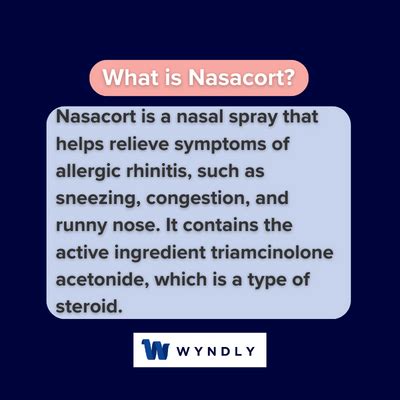The Nasacort Timeframe: What to Expect
Nasacort AQ (triamcinolone acetonide nasal spray) is a popular corticosteroid nasal spray used to treat allergic rhinitis (hay fever) and other nasal inflammatory conditions. Many people wonder, "How long does it take for Nasacort to work?" The answer isn't a simple number of hours, but rather a process that unfolds over several days. This article will explore the Nasacort timeframe, addressing common questions and expectations regarding its effectiveness.
How Long Does It Take for Nasacort to Start Working?
You won't experience immediate relief with Nasacort. Unlike some antihistamines that offer quicker, albeit shorter-lived, symptom relief, Nasacort works by reducing inflammation in your nasal passages. This process takes time. You'll typically start noticing a reduction in symptoms like sneezing, runny nose, and congestion within 12 to 24 hours of your first dose. However, the full effect, meaning significant symptom improvement, usually takes several days to a week. Consistent use is key to experiencing the full benefits.
When Will I See Significant Improvement with Nasacort?
While you might feel some initial relief within a day, you should expect to see substantial improvement in your symptoms within 3-5 days of consistent use. By the end of the first week, many individuals experience significant relief from their nasal allergy symptoms. If you don't notice any improvement after a week, consult your doctor. They may adjust your dosage or recommend alternative treatment options.
How Long Should I Use Nasacort?
The duration of Nasacort use depends entirely on your individual needs and the severity of your symptoms. For seasonal allergies, you might use it only during allergy season. For year-round allergies, continuous use may be necessary. Your doctor will provide guidance on the appropriate duration of treatment, but it's crucial to follow the prescribed dosage and duration meticulously. Do not stop using Nasacort abruptly without consulting your doctor, even if you feel better.
What if Nasacort Isn't Working After a Week?
If your symptoms haven't improved after a week of consistent Nasacort use, several factors could be at play:
- Incorrect usage: Ensure you're using the spray correctly as per the instructions. Improper technique can reduce effectiveness.
- Dosage: You might need a higher dosage, but this should only be determined by your doctor.
- Underlying condition: Your symptoms might be due to a different condition than allergies, requiring a different treatment approach.
- Severe allergies: Your allergies might be exceptionally severe, necessitating stronger medication or combination therapy.
It's crucial to consult your doctor if you're not experiencing improvement after a week of using Nasacort. They can properly assess your situation and recommend the best course of action.
Can I Use Nasacort for Immediate Relief?
No, Nasacort is not intended for immediate relief. For immediate relief from allergy symptoms, consider using a quick-acting antihistamine or decongestant. However, these medications only provide temporary relief and should not be used as a replacement for long-term allergy management with Nasacort.
Is it Safe to Use Nasacort Long-Term?
While Nasacort is generally safe for long-term use, it's crucial to discuss this with your doctor. Long-term use might have potential side effects, and your doctor can monitor your progress and ensure the benefits outweigh the risks.
What are the potential side effects of Nasacort?
Like any medication, Nasacort can have side effects, although they're generally mild. Common side effects may include nasal burning or stinging, nosebleeds, headache, and sore throat. Rare but more serious side effects include glaucoma, cataracts, and increased risk of infections. Discuss any concerns with your healthcare provider.
Disclaimer: This information is for educational purposes only and should not be considered medical advice. Always consult your doctor or healthcare provider before starting any new medication, including Nasacort. They can assess your specific needs and recommend the best course of treatment.

